Angola's Green Hydrogen Ambitions: Paving the Way for Africa's Sustainable Energy Future
Key Ideas
- Angola announces plans for its first significant green hydrogen project, aiming to produce 400,000 tons annually by 2027.
- Green hydrogen highlighted as a key solution for energy storage and a promising alternative in sectors like steel production and aviation.
- Challenges in green energy transition include financial hurdles for emerging economies like Bangladesh, emphasizing the need for effective policy frameworks.
- Global focus on sustainable energy with the rapid shift towards renewables, urging for strategic investments and harmonizing climate financing frameworks.
Angola is venturing into the green energy sector with its first large-scale green hydrogen project, set to produce 400,000 tons annually by 2027. Spearheaded by Sonangol, the project highlights Angola's potential as a major hydrogen exporter and its existing energy infrastructure. This initiative was emphasized at the Africa Energy Week 2024, where green hydrogen was touted not just as an industrial feedstock but also as a crucial element for energy storage and transitioning various sectors towards greener alternatives.
The global dynamics surrounding green energy reveal opportunities for Africa to secure a position in the hydrogen value chain, particularly in response to the EU's ambitious hydrogen goals. However, challenges persist, with emerging economies like Bangladesh facing financial pressures and struggling to shift from fossil fuel dependency. The need for targeted sustainability strategies and efficient policy frameworks is essential to drive broader adoption of renewables.
Financial institutions like UBS stress the importance of strategic investments to reduce emissions and drive sustainable energy growth. The focus is on accelerating commercial viability through 'small tent' approaches and addressing funding disparities, especially for projects in mid-development stages. The aim is to track investment impacts and advance environmental goals.
As the world moves towards sustainable energy, there is a growing urgency to close the gap between rich and developing nations in accessing climate financing. DNV's research highlights the ongoing disparity in energy spending between fossil fuels and renewables, underscoring the need to optimize capital distribution. Efforts toward standardizing sustainability definitions globally and harmonizing climate financing frameworks are gaining momentum to facilitate clean energy transitions.
Looking ahead to COP29, discussions will center on streamlined policies to bolster funding for clean energy and climate mitigation strategies. The focus is on reducing reliance on fossil fuels and accelerating the green energy revolution. With increased momentum in green hydrogen projects and global investments, the future of energy appears promising, rooted in sustainability innovations.
Topics
Africa
Renewable Power
Energy Transition
Green Technology
Sustainable Energy
Investment Trends
Financial Institutions
Global Dynamics
Latest News
